Serving 148 students in grades 9-12, La Paloma High (Continuation School) ranks in the bottom 50% of all schools in California for overall test scores (math proficiency is bottom 50%, and reading proficiency is bottom 50%).
The percentage of students achieving proficiency in math is ≤5% (which is lower than the California state average of 33%). The percentage of students achieving proficiency in reading/language arts is 15-19% (which is lower than the California state average of 47%).
The student:teacher ratio of 12:1 is lower than the California state level of 21:1.
Minority enrollment is 82% of the student body (majority Hispanic), which is higher than the California state average of 80% (majority Hispanic).
Quick Stats (2025)
- School Type: Alternative school
- Grades: 9-12
- Enrollment: 148 students
- Student:Teacher Ratio: 12:1
- Minority Enrollment: 82%
- Graduation Rate: 60-64% (Btm 50% in CA)
- Overall Testing Rank: Bottom 50%
- Math Proficiency: ≤5% (Btm 50%)
- Reading Proficiency: 15-19% (Btm 50%)
- Science Proficiency: 6-9% (Btm 50%)
- Source: National Center for Education Statistics (NCES), CA Dept. of Education
Top Rankings
La Paloma High (Continuation School) ranks among the top 20% of public schools in California for:
Category
Attribute
Community Size
Student Attention
School Overview
La Paloma High (Continuation School)'s student population of 148 students has declined by 12% over five school years.
The teacher population of 12 teachers has grown by 9% over five school years.
School Type
Grades Offered
Grades 9-12
Total Students
148 students
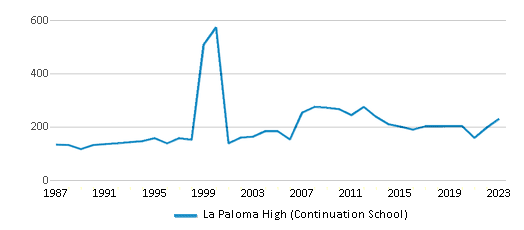
Gender %
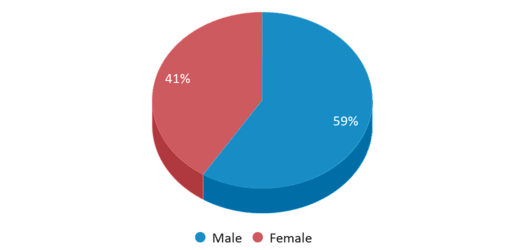
Total Classroom Teachers
12 teachers
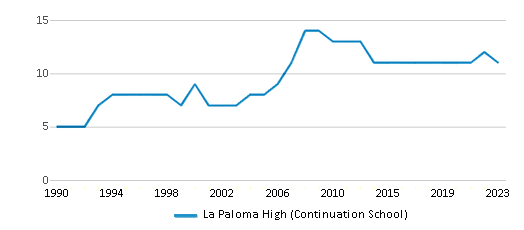
Students by Grade
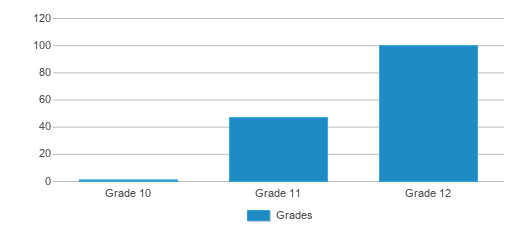
School Rankings
La Paloma High (Continuation School) ranks within the bottom 50% of all 9,602 schools in California (based off of combined math and reading proficiency testing data).
The diversity score of La Paloma High (Continuation School) is 0.59, which is less than the diversity score at state average of 0.63. The school's diversity has stayed relatively flat over five school years.
Overall Testing Rank
#9299 out of 9602 schools
(Bottom 50%)
(Bottom 50%)
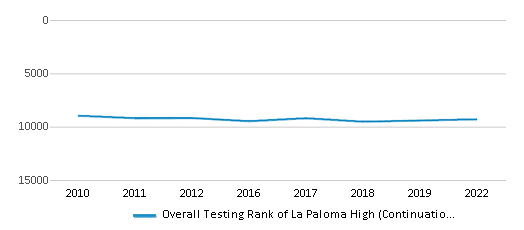
Math Test Scores (% Proficient)
≤5%
33%
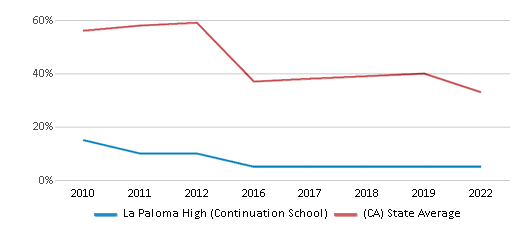
Reading/Language Arts Test Scores (% Proficient)
15-19%
47%
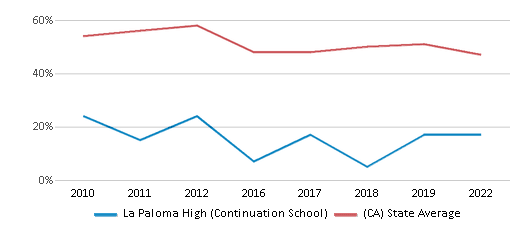
Science Test Scores (% Proficient)
6-9%
29%
Student : Teacher Ratio
12:1
21:1
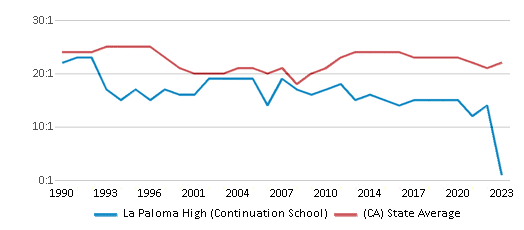
American Indian
1%
1%
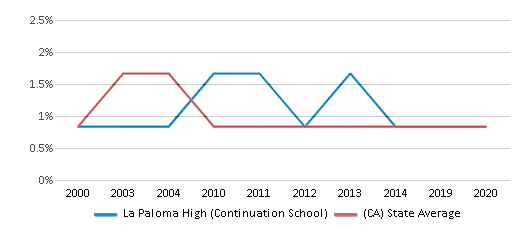
Asian
2%
12%
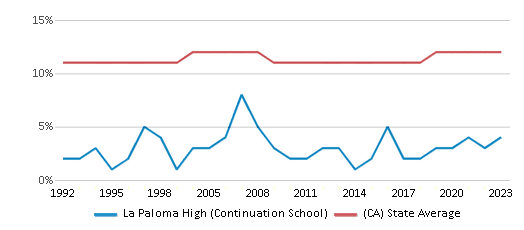
Hispanic
60%
56%
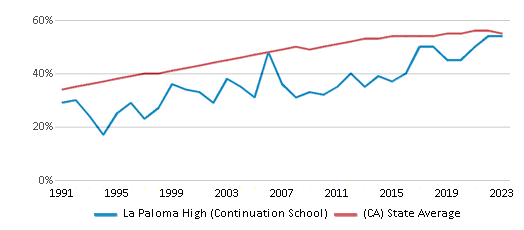
Black
13%
5%
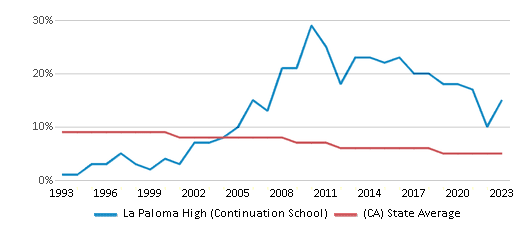
White
18%
20%
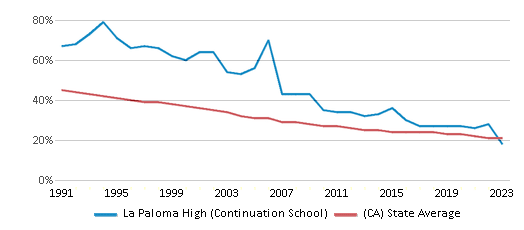
Hawaiian
1%
n/a
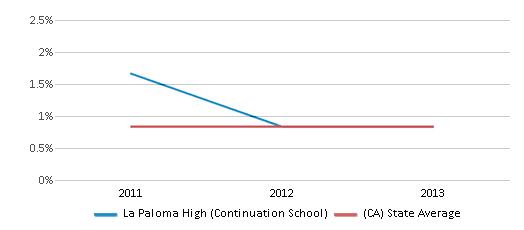
Two or more races
5%
6%
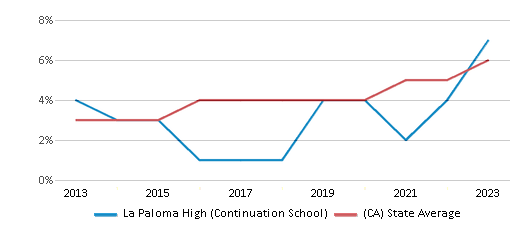
All Ethnic Groups
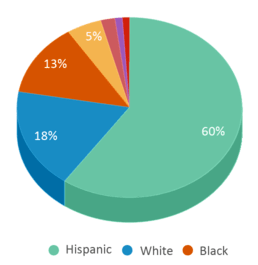
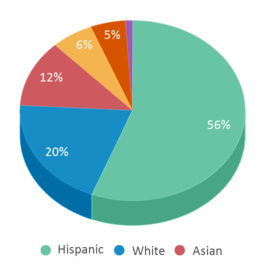
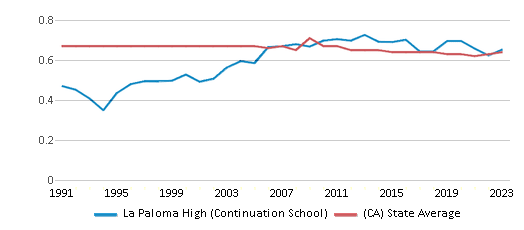
Graduation Rate
60-64%
87%
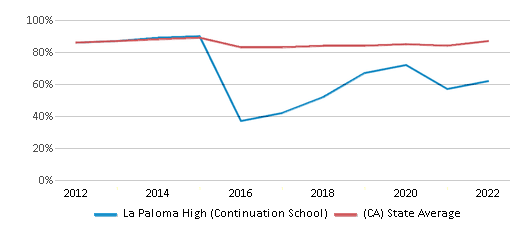
Eligible for Free Lunch
47%
54%
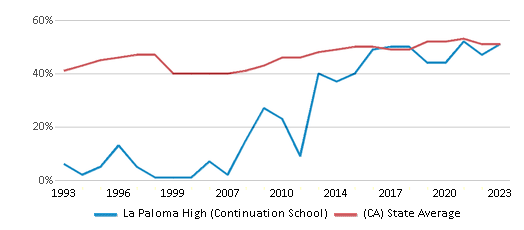
Eligible for Reduced Lunch (21-22)
1%
7%
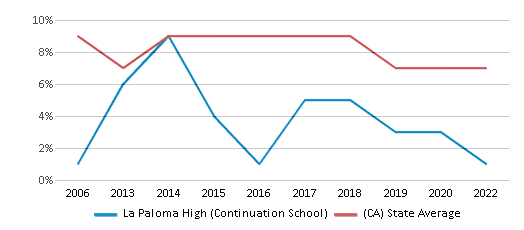
School Statewide Testing
School District Name
Source: National Center for Education Statistics (NCES), CA Dept. of Education
Profile last updated: 02/09/2025
Frequently Asked Questions
What is La Paloma High (Continuation School)'s ranking?
La Paloma High (Continuation School) is ranked #9299 out of 9,602 schools, which ranks it among the bottom 50% of public schools in California.
What percent of students have achieved state testing proficiency in math and reading?
≤5% of students have achieved math proficiency (compared to the 33% CA state average), while 15-19% of students have achieved reading proficiency (compared to the 47% CA state average).
What is the graduation rate of La Paloma High (Continuation School)?
The graduation rate of La Paloma High (Continuation School) is 60-64%, which is lower than the California state average of 87%.
How many students attend La Paloma High (Continuation School)?
148 students attend La Paloma High (Continuation School).
What is the racial composition of the student body?
60% of La Paloma High (Continuation School) students are Hispanic, 18% of students are White, 13% of students are Black, 5% of students are Two or more races, 2% of students are Asian, 1% of students are American Indian, and 1% of students are Hawaiian.
What is the student:teacher ratio of La Paloma High (Continuation School)?
La Paloma High (Continuation School) has a student ration of 12:1, which is lower than the California state average of 21:1.
What grades does La Paloma High (Continuation School) offer ?
La Paloma High (Continuation School) offers enrollment in grades 9-12
What school district is La Paloma High (Continuation School) part of?
La Paloma High (Continuation School) is part of Liberty Union High School District.
School Calendar
View the La Paloma High (Continuation School) yearly calendar below. Note key dates such as:
Event
Date
Spring Break
March 17, 2025 (Monday)
School Reviews
5 3/23/2009
La Paloma evaluates each student and assesses their actual classroom knowledge. Each teacher earned a Master's Degree in Psychology as well as their regular teaching credentials. Students attended school on a minimum of 3.5 hours M-F. That accommodates four classes. They could attend more classes, earning the required credits per class. Students were on a colored card grading system and earned points in class that add up to academic credits. The more credits the student earned, the better color the card. LP students enter into an agreement upon turning 18 informing them of the increased accountability for attendance and how the parents were no longer held accountable. Students were also informed of the consequences if they did not comply.
(I graduated 1985) the student's final assignment is to compose a one page essay telling student experiences at La Paloma. This was graded by the Principal.
Review La Paloma High (Continuation School). Reviews should be a few sentences in length. Please include any comments on:
- Quality of academic programs, teachers, and facilities
- Availability of music, art, sports and other extracurricular activities
Recent Articles

What Is A Charter School?
Explore the world of charter schools in this comprehensive guide. Learn about their history, how they operate, and the pros and cons of this educational innovation. Discover key facts about charter schools, including admission policies, demographics, and funding, as well as what to look for when considering a charter school for your child.

10 Reasons Why High School Sports Benefit Students
Discover the 10 compelling reasons why high school sports are beneficial for students. This comprehensive article explores how athletics enhance academic performance, foster personal growth, and develop crucial life skills. From improved fitness and time management to leadership development and community representation, learn why participating in high school sports can be a game-changer for students' overall success and well-being.

February 05, 2025
Understanding the U.S. Department of Education: Structure, Impact, and EvolutionWe explore how the Department of Education shapes American education, from its cabinet-level leadership to its impact on millions of students, written for general audiences seeking clarity on this vital institution.





